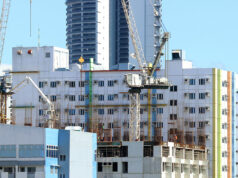COVID-19 to push PHL into ‘mild recession’
THE Philippine economy is seen to enter a “mild recession” and post a less than 0.5% contraction for the full year, as the coronavirus disease 2019 (COVID-19) and the ongoing Luzon-wide lockdown brought most economic activities to a halt, GlobalSource Partners said.
Romeo L. Bernardo, GlobalSource country analyst for the Philippines, said gross domestic product (GDP) for 2020 could contract by “less than 0.5%” this year but quickly recover next year if governments around the world will contain the COVID-19 pandemic by the end of June, without a substantial rise in cases that will require lockdowns.
“Given this, we think the domestic economy will suffer a mild recession, less than 0.5% GDP contraction, that it can quickly grow out of by 2021. But the next two quarters will be difficult for everyone, worst in 2Q as infections and deaths rise and as uncertainties about containing COVID-19 and preserving firms’ balance sheets intensify,” Mr. Bernardo said in a brief e-mailed to journalists on Monday.
However, despite the base case recession outlook, he said the Philippines may eke out a 1-2% GDP growth, albeit lower than its previous 5.7% outlook.
“Despite our grim base case recession outlook for this year, we think the economy has the upside potential of generating 1-2% growth for this year if government is able to manage well the economy’s transition out of the ECQ and provide swift and ample on- and/or off-budget support to the general public and affected firms, especially small businesses,” he said.
The forecast compares to the three-percent growth projection by the World Bank and two-percent estimate by the Asian Development Bank.
“The main source of GDP growth this time around is government, which has a spending envelope of about 20% of GDP this year plus the recently introduced rescue package worth 1.2% of GDP. Nevertheless, we think these are not enough to offset the downturn in private activity,” he said.
The government initially rolled out a P27.1-billion funding package to assist affected sectors and another P200 billion worth of cash aid to low-income families.
This will likely soften the drastic decline in public consumption, equivalent to 70% of GDP, due to the ECQ.
According to Mr. Bernardo, consumers cannot rely on remittances for spending as some overseas Filipino workers are laid off amid the global downturn.
“Nevertheless, we think these (rescue packages) are not enough to offset the downturn in private activity. We are awaiting the features of a third fiscal package that we hear is being crafted primarily to help MSMEs (micro, small and medium enterprises) and which may keep more people in their jobs and thus hasten post-quarantine recovery,” he added.
Mr. Bernardo said the economic fallout from COVID-19 will likely linger beyond the lockdown period whether the quarantine is lifted as planned, modified or extended.
He warned that lifting the ECQ “too early” could cause confirmed cases to surge again, resulting in further damage.
On the other hand, not lifting it “soon enough” may force businesses into insolvency, which would mean more job losses, he added.
NORMALCY BEFORE LATE Q3 UNLIKELY
Mr. Bernardo said returning to a state of “normalcy” before late third quarter “is unlikely” if the ECQ will be extended for another two weeks from the initial schedule of April 12.
“Even if government is able to get ahead of the virus and restore confidence by the time the quarantine is lifted, we think a return to some degree of normalcy before late 3Q is unlikely, especially given uncoordinated handling of the pandemic globally that weakens prospects for a swifter global recovery,” he said.
While the government allocated a P200-billion rescue package for low-income households, he said many businesses, especially MSMEs, are trying to keep employees paid despite low sales and supply chain disruptions.
Further, Mr. Bernardo noted that the government has relied heavily on aggressive monetary easing by the central bank. He urged banks to boost lending, after a 75-basis point (bp) cut on benchmark interest rates and the 400 bps reduction on banks’ reserve requirement so far this year.
“We think that on its own, monetary accommodation is unlikely to overcome banks’ risk-aversion in a time of crisis, especially with credit raters issuing negative outlook warnings on bank credits. Hence, we think the fiscal package being crafted for MSMEs is critical to give lenders more comfort,” he said. — Beatrice M. Laforga



